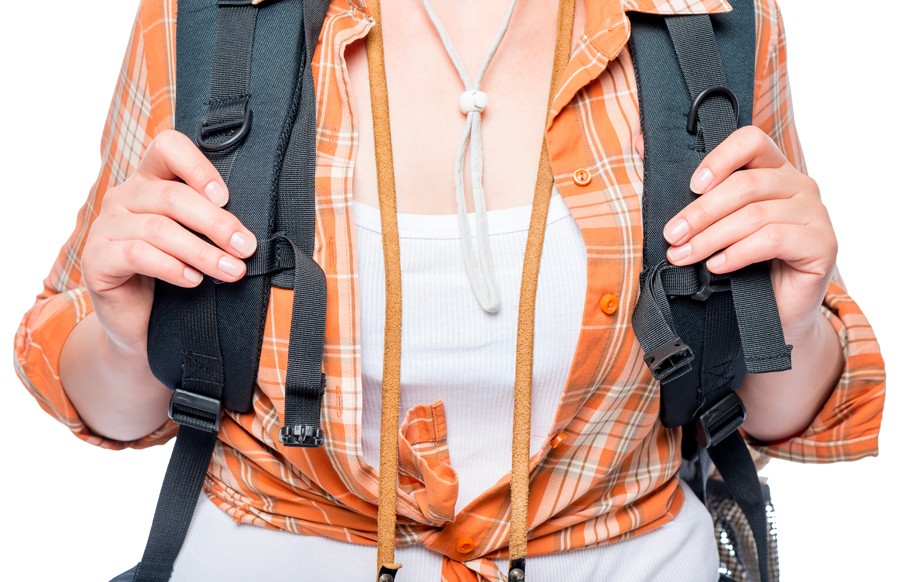
By Guilianna Nenna
Busy, able-bodied teenagers strode past my 16-year-old daughter on her high school campus. Through their banter, they glared side-ways, at my scarf-covered daughter. She was fused in cream and pink over her head, then in purple, blue, and red around her neck. Not having seen Sofia dressed in that way, and most probably not sure how to react, their eyes darted away.
“Hi, hi,” my girl chirped to other teens, eyes moist in the wind. “Come on, Mom,” she commanded me. She grabbed at one end of her fluttering headdress, leaving passers-by to wonder what was with the new-wave fashion statement. Straggling behind Sofia’s lurches was her scarfless, blanched-out, middle-aged mother, struggling under the weight of her 30-liter volume backpack.
While my face sent ‘old lady’ alerts to most teens, my mind kept telling me I was forever young. I was a 20-wantto-be, not because I dawdled on my daughter’s campus, but rather because I was trying to walk erect, possibly resembling a Neanderthal. I huffed under my daughter’s load, a day’s worth of textbooks, notebooks, art pencils, a 36mm camera, two one-half liter glass bottles of tea, meds, and —oh— her tablet. I broke into a sweat in the chill, trying to keep pace.
With an unbalanced but determined gait, Sofia clutched her cloth lunchbox with the same grace that her greatgrandmother had carried her handbag: hinged over the elbow, forearm raised, fingers held like a queen. Nonna looked people in the eye, never glancing down or up, never pretending she was more or less than others, using a full range of vision to notice small details, smiling slightly every-now-and-again. Sofia had the same look, the soft air of confidence, same joy to be alive. And she had the best of her great-grandma: gnocchi-rolling hands handed down from the centuries, precision ingredient-dosing, eye for art, avid reader. No one else in the family could roll gnocchi into small art forms, dimples on display, though we all tried. Nonna was the reference for the extended family, including her sons in-laws. Now it would be Sofia.
Inside the stone building, my daughter labored up the stairs to her classroom, leaning into each step, one hand holding the railing and the other gripping my arm—like her great-grandmother. She was passed by more student stares, but she forgot about uttering ‘hi.’ Their gazes trailed towards me, the sweating, toiling mother. My smiles were met by either blank stares or eyes darting away.
Some new-age thinkers say that time is relative, like families. Past, present, future all take place in the same concurrent moments in non-linear time, so that families are ever present. We just don’t see them. As though we have a hundred faces, our “selves” are connected to spirits living in different but connected planes. Sofia’s greatgrandmother existing in a space not entirely unreachable.
My daughter has taught me that this posit is true; I have never given up thinking that Sofia’s great-grandmother breathes through her. I have never given up thinking that with the right clothes and attitude, I will always be strong willed, forever the pack mule. Climbing the stone steps in the school building in that moment, my mind projected me to times when I carried my Nonna’s jars and laundry from the basement; when Nonna recounted how she had carried her first child the duration of his five years of life, how she had fetched, with him on her arm, his prescription for aqua vitae at the pharmacy during Prohibition; how she had been carrying his photos in her wallet since he was born in 1932.
The pictures never left her—even after her wallet got stolen.
“I cried for weeks,” she told me as a pre-teen, “till my wallet showed up in the mail one day — without the money of course. Someone must have dropped it in the mailbox. All was there, my driver’s license, my credit cards, but most importantly, Alberto’s pictures. He was telling me, ‘stop crying, Mamma, I am still with you.’”
And then, there we all were, climbing the school stairs together: the dislocated, typically dysfunctional family of the teen, great-grandmother, the 20-want-to-benearing-50, the uncle never-met, the bundled spirits, cancers past and present. My grandmother was suddenly telling me what to pack for Sofia’s lunch for the next day— which jar to fetch from the basement.
Over one hundred years ago, Stephen Crane wrote:
A man said to the universe,
“Sir, I exist!”
“However,” replied the universe,
“The fact has not created in me
A sense of obligation.”
I can’t say that I agree, especially as he wrote during my grandmother’s lifetime. I still think that the universe must have given my daughter a tumor by mistake. That is why her great-grandmother pipes up through her, telling her to carry her lunch box with the same dignity of the 60-year-old family matriarch who used to wear deep red lipstick. That is why her great-grandmother helps her not to be daunted by the looks she gets from other students, especially those who don’t have the time to even consider offering to carry her heavy backpack for her. The pasta-rolling, book-choosing, art-creating—those are all gifts bestowed to seal the common bonds which keep the family together even when torn apart—to stay in touch—and to keep my daughter going, to live beyond the boundaries she faces now.
We passed more teenagers through the hallway. They, too, looked past my daughter. Sofia smiled between two scarves. In my mind, I spoke softly to Stephen Crane in his other plane, not to hurt his feelings, ‘without us, no one will know the universe.’ I opened the classroom door, dropped my daughter’s backpack, and released her the same way I sent her off on her first day of school ages ago.